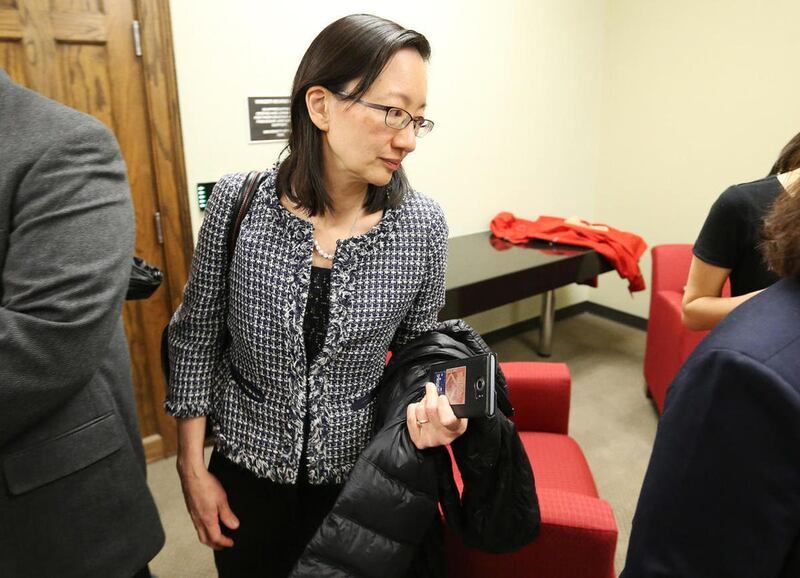SALT LAKE CITY — On April 12, University of Utah neurologist Dr. Stefan Pulst was speaking on KUER about his research on ALS, also known as Lou Gehrig’s disease — research that brought publication twice in one of the most prestigious scientific journals in the world, Nature.
Two days later, Pulst was out — demoted from his position as the chair of the University of Utah neurology department by the school’s health care chief, Dr. Vivian Lee.
The dismissal shocked Pulst, who had doubled the size of the faculty, been nationally and internationally recognized for his research and had greatly increased the amount of research funding flowing to the department.
Nine months prior, Pulst said, Lee had told him that she would review the department, a process that is usually conducted by an external panel of evaluators.
But Lee never did, according to Pulst. And soon, he was out.
Lee, the University of Utah’s embattled senior vice president of health sciences, has come under fire after she and University of Utah President David Pershing dismissed popular Huntsman Cancer Institute Director Mary Beckerle last week. Beckerle was reinstated after Jon Huntsman Sr. threatened to withhold millions of dollars in planned contributions to the cancer center he helped found, and will now answer to Pershing directly rather than Lee.
“There appears to be a pattern of leadership style,” said Pulst, who noted that he was one of several department chairs and administrators at the U. who say they were fired or demoted by Lee in a manner similar to Beckerle.
Hired in 2011 to manage the sprawling $2 billion health sciences organization at the university, Lee quickly established a reputation as a disruptive thinker who set extraordinarily high standards for employees, according to faculty interviewed by the Deseret News.
Some said she pushed too fast, too hard.
After Beckerle's abrupt dismissal, several faculty members joined Huntsman, the billionaire philanthropist who provided the initial funding to start the Huntsman Cancer Institute in 1993, in calling for Lee’s firing.
Dr. Edward Ashwood, a professor of pathology who was president and CEO of ARUP Laboratories for six years, said he was forced to resign by Lee in 2015 after increasing the profit margins of the organization 22 percent over the last year to nearly $80 million.
It was an “absolute surprise,” Ashwood said. “We were pulling out of the beginning of the Affordable Care Act, and doing a really phenomenal job at that, and we had launched some very innovative projects.”
But according to Ashwood, Lee told him that he was not innovative enough and did not take enough risk.
After Lee requested his resignation several times, Ashwood became an associate vice president for government relations at ARUP in July of last year. He resigned his tenured professorship in February.
Ashwood, like many other members of the campus community, remains perplexed about what could have led to Beckerle's firing.
“They deserve an explanation and they deserve it for the U. to delve down and take a look at what’s been happening,” said Ashwood.
Lee has not responded to repeated requests over several days for comment from the Deseret News.
But 13 department chairs came to Lee's defense on Tuesday, penning an open letter to Pershing earlier this week defending Lee as a person "of impeccable character who continuously demonstrates integrity, compassion, thoughtfulness, and fairness."
Kathy Wilets, a spokeswoman for University of Utah Health, also said in a statement on Thursday that Lee “is back to work” and has the full support of the president and the board of trustees.
“We look forward to moving ahead,” Wilets said.
Dr. Bob Pendleton, a professor and chief medical quality officer at University of Utah Health, called Lee a transformational leader who has made diversity and inclusion a focus even as she has pushed employees to go beyond what was once thought possible.
“There is no doubt she sets very high expectations and really encourages people to think outside the box,” said Pendleton.
Part of Lee's role when brought on in 2011, according to Pendleton, was to shake up how things are done at the health system by breaking down barriers between different departments and streamlining care between primary care doctors, surgeons, oncologists and other specialties so that patients can get better care at a lower cost.
But some faculty members questioned whether Lee sacrificed morale and trust between colleagues for greater efficiencies.
Rena D’Souza, the former dean of the U.’s School of Dentistry, said she was blindsided when Lee dismissed her as dean less than 1½ years after she moved her family from Texas to Utah to take the position.
After recruiting new faculty, building the foundational curriculum and raising significant funds for the new dental school, D’Souza said she was pulled out of a meeting and given a letter by Lee informing her of her dismissal.
She also said that when asked, Lee did not give her a reason.
Ultimately, D’Souza said, it is not the outcome that matters as much as the process.
“The question I ask is whether Dr. Lee’s drive to enhance the national reputation of the U. at the cost of so many damaged lives and careers is eroding rather than enhancing its reputation,” D’Souza said.


